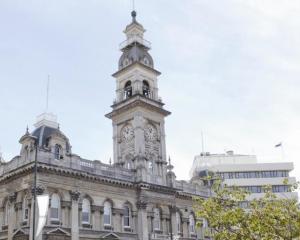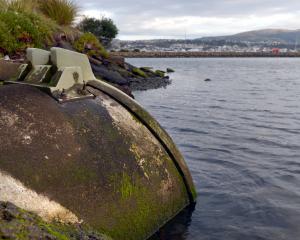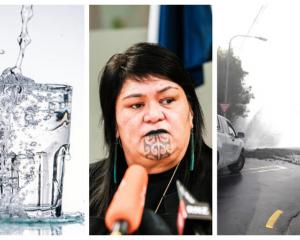Dunedin councillors have today voted 7-6 to overturn their decision to join Three Waters lobby group Communities 4 Local Democracy.
Mayor Aaron Hawkins said reversing last month's decision would allow the council to begin to repair its relationship with mana whenua, who had been disappointed in the council's previous stance.
The seven elected representatives of the city who voted to revoke the council's previous decision were Mr Hawkins, deputy mayor Christine Garey and Crs David Benson-Pope, Marie Laufiso, Mike Lord, Chris Staynes and Steve Walker.
The six who voted against were Crs Carmen Houlahan, Jim O'Malley, Sophie Barker, Jules Radich, Andrew Whiley and Lee Vandervis.
Cr Rachel Elder abstained and Cr Doug Hall was absent.
Cr Hall said he was genuinely not able to attend the meeting. "If you want to talk to the surgeon, you can."
Te Runanga o Otakou and Kati Huirapa Runaka ki Puketeraki had made clear their disappointment with the council's previous stance when they withdrew from the council's Maori participation working party, pending a period of reflection.

The reaction from the two runanga had been of some surprise to some councillors and there would be no shame in them deciding after self-reflection to chart a different course, he said.
The issue was fundamentally about which of its relationships the council prioritised - a relationship with a group that lacked interest in engaging with iwi/Maori or with local mana whenua.
Runanga o Otakou chairwoman Rachel Wesley and Kati Huirapa ki Puketeraki chairman Matapura Ellison said they were greatly heartened by today's decision.
The relationship with the city council required ongoing work and commitment from both sides, they said in a joint statement.
"We remain committed to working together in good faith and trust for the community and the city. As partners, we respect whatever position the Dunedin City Council members ultimately decide to take on Three Waters.
"We respect the council’s right to argue for its position, just as Kai Tahu will argue strongly for ours in an effort to ensure more equitable, sustainable and affordable water services.
"What we disagreed with strongly was the decision to outsource the council’s position to a splinter group campaign that has not engaged with mana whenua in any meaningful way.
"These decisions should be made in the interests of the Dunedin and Otago communities, and the wider takiwa."

She said the council had made a mockery of its commitment to the principles of the Treaty of Waitangi and it needed to change course.
Cr Vandervis said the issue came down to whether councillors valued local democracy or accepted centralised control.
He objected to the labelling of Communities 4 Local Democracy as a splinter group, when it had grown to 32 councils.
Cr Steve Walker said the council's previous decision made him feel sick in the stomach. Reversing was about taking "our Crown-delegated obligations seriously".
Sticking with Communities 4 Local Democracy would have achieved "absolutely nothing, other than the destruction of our relationship with mana whenua".
Cr Elder described the situation as lose-lose. She said she was torn and heartbroken by what transpired as a result of the Government's poor process and sorry the council's previous decision had hurt Ngai Tahu so deeply.
The Government came under fire from several councillors for its lack of consultation with councils and for stripping councils of having a choice about opting in or out of the reforms.
Plans to establish four regional water services entities to take over some functions from councils have continued to be controversial.
Cr O'Malley said the city council was losing control of $3 billion of assets and it needed to strenuously challenge the basis for that.
The mayor had not been helpful concerning efforts to facilitate engagement with Ngai Tahu, he said.
Under the reforms, iwi are to have a governance role in the entities.
Cr O'Malley said the Government had been negotiating with Ngai Tahu at the same time as councils were supposed to be assessing whether they should opt in or out.
This appeared to suggest the Government was not greatly interested in input from councils, he inferred.
Cr Whiley said the council had now put itself at the mercy of Three Waters reform, as dictated by central government.
Cr Houlahan described the Government as a bully that had given councils little or no say.
Cr Benson-Pope said there were several aspects of Three Waters reform that councillors were united in opposing.
The Dunedin council would not be constrained about expressing opposition if it withdrew from the collective of councils, he said.
The council had "got into a tent with people many of us would not want to share time with".
"We got it wrong," Cr Benson-Pope said. "It's embarrassing for all of us. This is an opportunity to begin to heal the hurt."
The council's move to join Communities 4 Local Democracy was controversial. It led to two runanga representing mana whenua to withdraw from the council's Maori participation working party.
Ms Wesley and Mr Ellison had earlier issued a statement, saying the runanga continuing their involvement in the working party "while the council appears to view the partnership as mere window dressing" would be inappropriate.
"We await the council's tangible commitment to a genuine and meaningful partnership before rejoining this forum."
If there had been a 7-7 tie today, the mayor would have had the casting vote.
Ms Wesley and Mr Ellison had said the two runanga took their responsibilities under the Treaty of Waitangi seriously in engaging with the council.
"We have withdrawn from the Maori participation working party while we assess whether that commitment is reciprocated by the council."
Mr Hawkins had said earlier that the relationship with mana whenua was the city's most important and the 8-7 vote by councillors to join Communities 4 Local Democracy represented the council walking away from that relationship.
“Fixing this will take time. It’s far easier to damage a relationship than repair one.”
Cr Radich asked what choices the council had to advocate its position to government, other than Local Government New Zealand. He suggested LGNZ was compromised because he said it signed up in support of Three Waters reform.
Councils were initially told they would be allowed to opt in or out of being part of the proposed reforms, but the Government withdrew that last year.











